Chris Baty's Blog, page 62
February 28, 2020
Meet Our New NaNo Intern, Jubilee!

We feel super lucky here at NaNo HQ to be able to work with some excellent interns! Today, meet Editorial Intern Jubilee Nelson, the newest addition to our team. You’ll be getting to know her better as a co-host of Virtual Write-Ins throughout Camp in April, but today she’s sharing a little bit about herself:
Greetings and salutations! I’m Jubilee Nelson and it’s a pleasure to meet you all.
Now, like many homeschoolers, English (or “Reading and Comprehension” as we called it) was my favorite subject. As a child I loved to listen to my mother read stories aloud — but it was only when I realized that I, too, could write my own epic tales of fantasy that the second part of my life began.
Creative writing quickly became my new obsession. Everything from the dramatic teenage poems in my diaries to writing prompts scribbled across what was supposed to be math homework. I was writing 24/7, and when I wasn’t writing I was prattling on and on about my next big idea.
I found NaNoWriMo as a teenager through online writing buddies, several of whom were also homeschoolers. Due to the fact that many of our homeschooling programs were at least partially online courses, we all spent a lot of time on our computers. I made a lot of dear friends through writing clubs and forums on the internet and even began moderating for some of these communities.
In Fall 2019 I had the amazing opportunity to join NaNoWriMo’s team as an Assistant Forum Moderator for the Young Writers Program. I absolutely loved that position because it allowed me to see the young writing community from a new perspective. Now as an adult, seeing young people brought together by a mutual love of writing is extremely heartwarming and nostalgic for me (In other words: I’m old now!). I loved watching online friendships blossom on the YWP forums and getting to see so many students excitedly sharing excerpts from their novels with each other like when I was a teen.
I’m back now at the NaNo HQ as an Editorial Intern this time around. I’ll be helping out here on the blog and occasionally in the YWP forums too. I’m looking forward to getting to see a new side of NaNoWriMo through this internship. Onward!
Jubilee Nelson is a Bay Area college student studying English literature and creative writing. Her passion for storytelling led her to NaNoWriMo as a high school student and she has followed the organization since. When not helping out in the YWP forums or on the NaNoWriMo blog, she enjoys experimenting with other forms of storytelling—primarily dance and cinematography—and spending time with her loved ones.
February 26, 2020
Join us for NaNo-Novel Premiere Week!If you wrote a novel in...
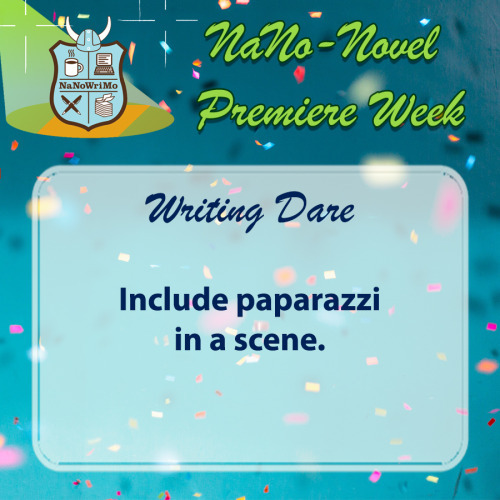
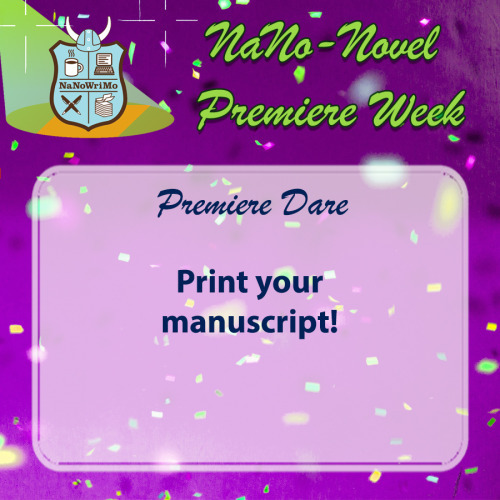
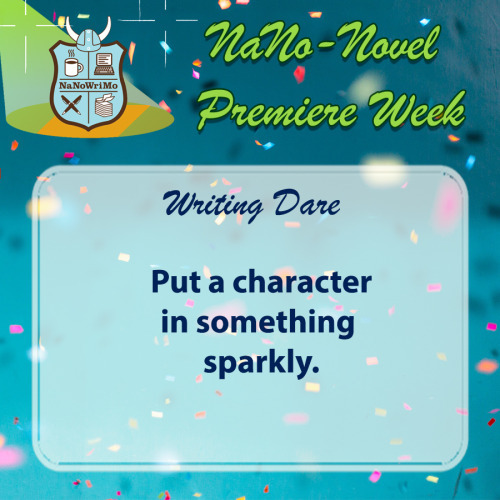
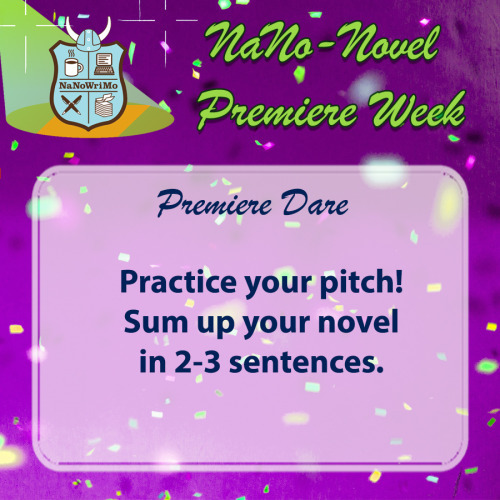
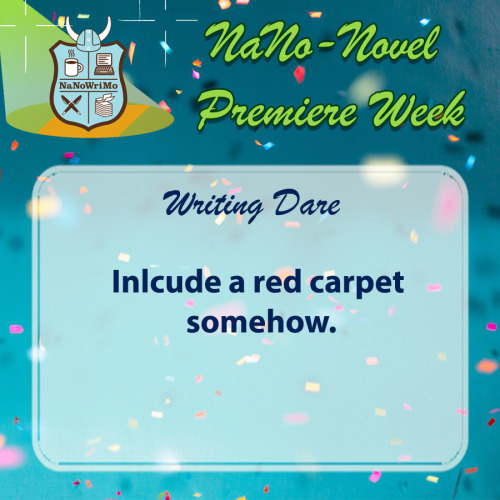
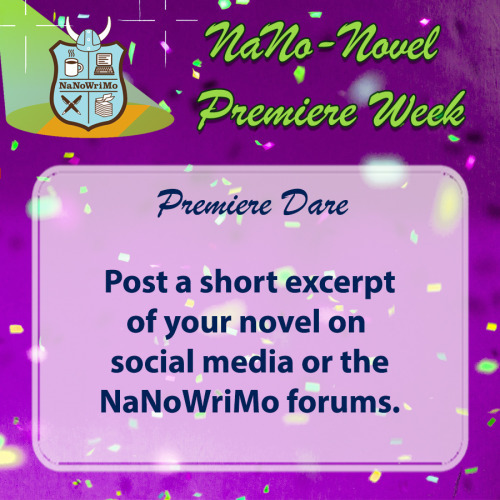
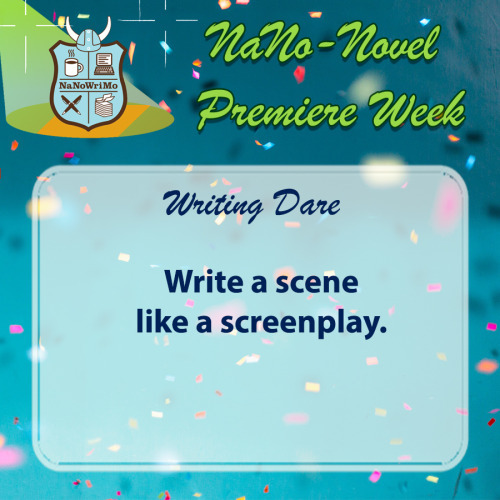

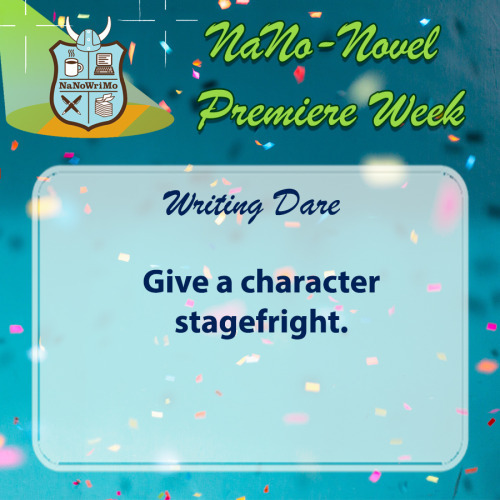
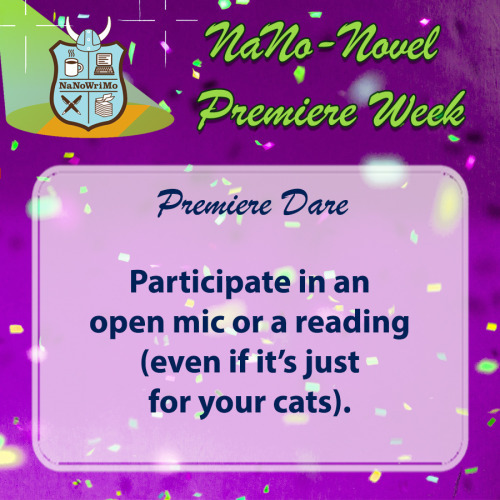
Join us for NaNo-Novel Premiere Week!
If you wrote a novel in November, now is the time to celebrate it! During NaNo-Novel Premiere Week, we’ll be providing resources to help you share your novel with the world. Take advantage of our writing dares and sharing dares in the images above to give your novel one last bit of razzle dazzle so it’s ready for the spotlight. The red carpet awaits your story!
To find out more about Premiere Week, visit our “I Wrote a Novel… Now What?” page on the NaNoWriMo website. You can also join in the Premiere Party we’re hosting at the Graduate hotel in Berkeley on Thursday, February 27, either online or in person!
Want to share your writing skills by contributing to the NaNoWriMo blog? Fill out this form!
Image description:
Five writing dares on a blue background, that read:
1. Include paparazzi in a scene.
2. Put a character in something sparkly.
3. Include a red carpet somehow.
4. Write a scene like a screenplay.
5. Give a character stagefright.
Five premiere dares on a purple background, that read:
1. Print your manuscript!
2. Practice your pitch! Sum up your novel in 2-3 sentences.
3. Post a short excerpt of your novel on social media or the NaNoWriMo forums.
4. Let someone you trust read a chapter of your novel.
5. Participate in an open mic or a reading (even if it’s just for your cats).
February 24, 2020
Query “Do”s and “No You Didn’t!”s

Ever wonder what goes into writing a great query letter? Today, agent Barbara Poelle is here to tell you some “Do”s and “Don’t”s of submitting your manuscript. Looking for more advice? Join us on Twitter for our #NaNoAgentChat tweet chat series where you’ll be able to ask Barbara and other agents your questions!
You’ve typed “THE END”. You’ve run your manuscript through the gauntlet of critique partner lashing. The moment has come: it’s time to query! Let’s get your book’s calling card out there with confidence and professionalism. Start your query with a great opening line, like some of these pulled from my own query inbox:
“Hi Barb, Looking for your next million dollar book? Well this is it!”
“Ms. Poelle, What if it was your job to kill babies?”
“I recently read [name of current client’s novel] and while I can see what drew you to it, I think you’ll agree I do it better.”
Oh. Hang on. Yeah, no, these are the opposite of great opening lines. You’ve worked so hard for your novel, let’s make sure you stick the landing on this, your first foray into the publishing industry: the query letter!
A query can be broken down into three easy sections: the hook, the book, and the cook.
The HOOK should include your log line, word count, and comp titles. Example:
In the vein of Kaethe Schwehn’s The Rending and the Nest and Emily St. John Mandel’s Station 11, I am proud to offer for your consideration my 90K word post-apocalyptic novel, The Ash Circus.
Boom, see? I get everything I need from that line — almost to the point where I might just skip to the pages. However the next section, the BOOK — five lines of premise, not plot — is going to be helpful for me as well, to understand the players and the world. Example:
Twenty-nine year old Nance Underwood lives in the world of ashes. After the catastrophic events of 10/17/2023, Nance’s world, along with the other 2 million survivors in the US, is one of day-to-day survival. But when strange fliers start to appear on buildings in her dilapidated New York City neighborhood advertising a one night only circus performance, and her 11 year old charge, Ghiz, begs to attend, she acquiesces, unsure if this is some new hope or some new horror against a backdrop of never-ending horrors. Nance finds out that it might be a bit of both.
So we get the characters, the atmosphere, setting, stakes. Premise, not plot.
And finally the COOK — that’s you! Doesn’t matter if you have an MFA or wrote this out long hand while on maternity leave, this section should just answer three main questions: why this book, why me, why now.
Ta-da! Queried! Now you try. When you’re ready come find me at Barbara.queries@irenegoodman.com .
(Also, oh my goodness, can someone please write me The Ash Circus?!)

Barbara Poelle began her publishing career as a freelance copywriter and editor before joining the Goodman Agency in 2007, but feels as if she truly prepared for the industry during her brief stint as a standup comic in Los Angeles. She has found success placing thrillers, literary suspense, Young Adult and upmarket fiction and is actively seeking her next great client in those genres, but is passionate about anything with a unique voice. Barbara is also the author of Funny You Should Ask: Mostly Serious Answers to Mostly Serious Questions About the Publishing Industry (Jan, 2020) based on her Writer’s Digest column of the same name.
February 21, 2020
Character Creation: The Minus 1 Rule

Whether you’re working on a first draft of a novel, or rewriting your story for the tenth time, characters are what really hold a story together. If you’re having trouble getting to know your characters, writer B. Berry is here today with a method to try:
You may encounter this issue when you sit down to write a novel: Somehow, you’ve stumbled upon an amazing plot, the worldbuilding is coming together cohesively, and you cannot wait for That Certain Twist.
But, with dawning horror, you realize that oh no, novels need more than a plot and a setting. They need characters to go in it. You figure your main character will be… a person. That sounds about right.
But what else?
Characters are most commonly what readers will fall in love with. Whether your project is plot-driven or character-driven, they are a vital part, and not something to fudge lightly.
There are many resources for character creation online, but I’ll share with you my favorite quick, dirty, and easy—yet somehow solid—method for creating characters entirely from scratch.
For a solid base, think of character traits. Most can be tentatively sorted into “good” and “bad”. It’s the mix of these that will make your character rounded and believable. But you still want them to be likeable, no matter how flawed, right?
The simplest beginning method is to take X amount of Good Traits, X minus 1 Bad Traits, put them in a blender, and pour out a basic character concept. (I know, how dare I add any sort of math to the writing process.) I call it the Minus 1 Rule, because it can be any amount of traits, any amount of characters, and apply to any type of character, be it protagonist, antagonist, side… or that one you meant to be a one-off but somehow became your not-so-secret favorite.
“The simplest beginning method is to take X amount of Good Traits, X minus 1 Bad Traits, put them in a blender, and pour out a basic character concept.”Example time! Let’s say I want to give my character three positive traits. I want them to be quick-witted, intelligent, and physically strong. So now we add two negative traits—they’re also a coward and unfriendly.
Context will drastically change how these traits are viewed, of course; a coward in a military sci-fi is going to be different than a coward in a YA romance. An unfriendly person in a character introduction will come off differently than an unfriendly person at a funeral. So because of the context of your story, you don’t have to worry about making your character too simple or too much like another character, and you may be able to play up either their best traits or their worst traits.
But speaking of other characters—it takes a cast (usually) to make a story, so chances are you’ll have to make quite a few, possibly in batches. So this step in the creation process would be The Absolute Perfect Time to figure out if you want any matching sets!
The most obvious of these character sets would probably be the foil, so think of your protagonist and antagonist. Do you want them both to have a temper, but your hero ultimately holds theirs, so thus they remain Good and Pure? Or perhaps your story is a battle of wits with two incredibly intelligent characters. (This is also a good time to think of matching/opposing/related backstories for your cast.)
Other tics or traits can come out after you have a solid base to build upon. Maybe the traits you initially picked don’t stick around, or morph into something else. Don’t take this rule as anything to set in stone.
Character creation is nothing scary, and you should never worry over-much about making your cast likeable—it is all about setting up a solid foundation for your cast to flourish upon. With the Minus 1 rule, it’s a quick and dirty way to tilt the “Readers Will Find This Dude Likeable” scale in your favor. Good luck, and good writing!
B. Berry is a novelist with a love of dark fantasy, LGBTQ rep, large casts, and larger wordcounts. She has published the first two in her psychological horror trilogy, THE ROOK and THE RAM, with the finale to come soon, and eagerly works on her next series beyond that. You can find her at @bberrywrites on twitter, or her website at www.bberrywrites.com.
Top photo by Chris Liverani on Unsplash.
February 19, 2020
We had a great tweet chat on our Twitter account last week with...

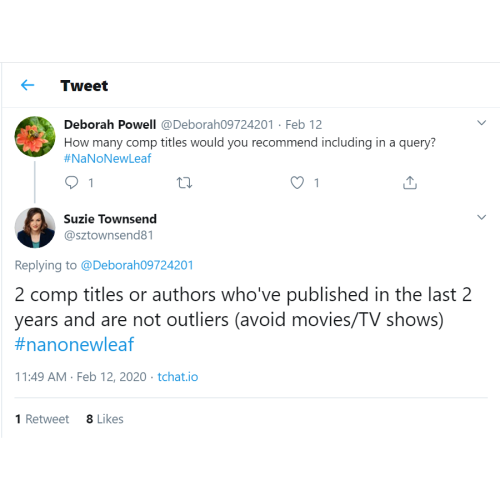
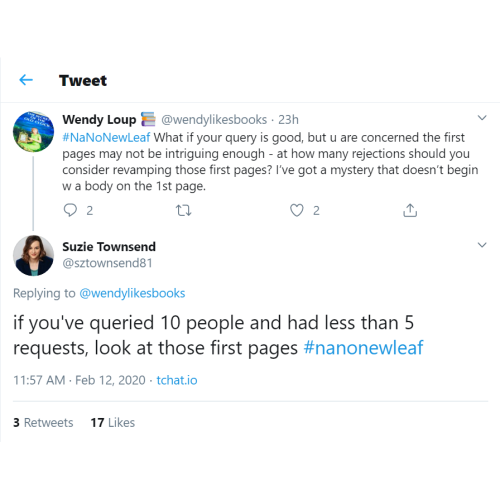

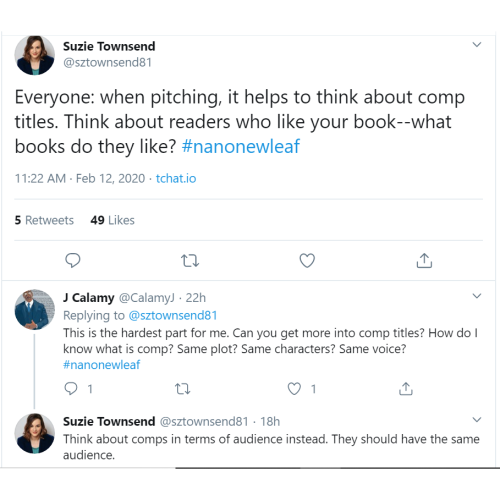

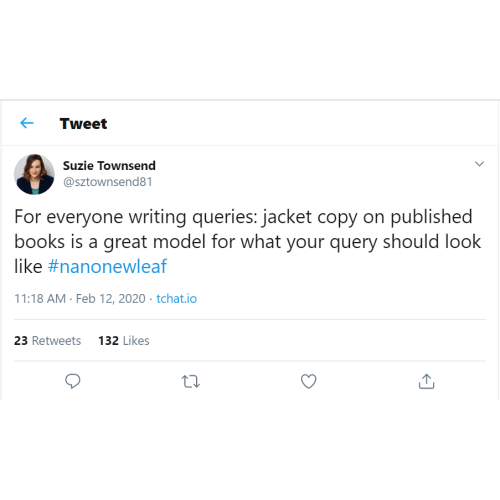
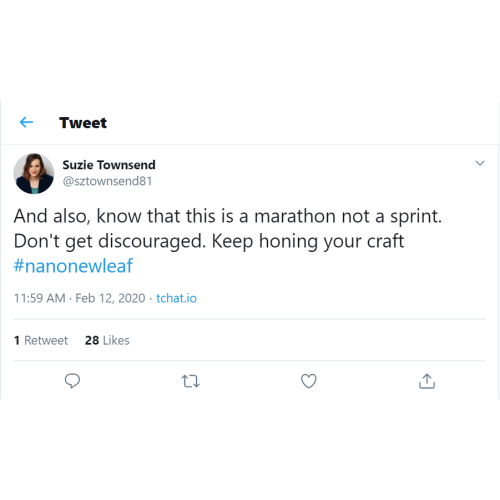
We had a great tweet chat on our Twitter account last week with fantastic advice for people who want to pitch and publish their novel.
Agents Suzie Townsend and Kathleen Ortiz from New Leaf Literary were gracious enough to field questions from eager writers! Do you have any publishing questions or advice?
Image descriptions: A series of screenshots from conversations on Twitter.
1. Belinda Grant: What are the best things writers can be doing for their future careers and agents in the stage before querying? What do you wish unagented writers would already know? #nanonewleaf
Kathleen Ortiz: Focusing on the craft of writing. Focus on creating the best manuscript and then when you have an agent, ask ALL the questions. Never be afraid to ask questions or for clarifications! #nanonewleaf
2. Deborah Powell: How many comp titles would you recommend including in a query? #nanonewleaf
Suzie Townsend: 2 comp titles or authors who have published in the last 2 years and are not outliers (avoid movies/TV shows) #nanonewleaf
3. Wendy Loop: #NaNoNewLeaf What if your query is good, but you are concerned the first paged may not be intriguing enough — at how many rejections should you consider revamping those first pages? I’ve got a mystery that doesn’t begin with a body on the first page.
Suzie Townsend: If you’ve queried 10 people and had less than 5 requests, look at those first pages. #nanonewleaf
4. Alexandra Garfield: #nanonewleaf Hi I’m Alexandra and I’m currently working on revising the first draft of my YA historical fantasy novel. Any recommendations on common pitfalls to avoid?
Suzie Townsend: Make sure the worldbuilding is so fleshed out it feels like a character in its own right. #nanonewleaf
5. Suzie Townsend: Everyone: when pitching, it helps to think about comp titles. Think about readers who like your book — what books do they like? #nanonewleaf
J Calamy: This is the hardest part for me. Can you get more into comp titles? How do I know what is comp? Same plot? Same characters? Same voice? #nanonewleaf
Suzie Townsend: Think about comps in terms of audience instead. They should have the same audience.
6. Gabrielle Gardner: #nanonewleaf What would you say captures your attention most in a query letter? Is there anything you look for or that turns you off a story?
Kathleen Ortiz: A strong pitch, a great voice, and short and to the point. Don’t ramble, it’s easy to get lost in a query and move on. #nanonewleaf
7. Suzie Townsend: And also, know that this is a marathon not a sprint. Don’t get discouraged. Keep honing your craft. #nanonewleaf
8. Suzie Townsend: For everyone writing queries: jacket copy on published books is a great model for what your query should look like. #nanonewleaf
February 14, 2020
I Published My NaNo-Novel: On Practice and Perseverence
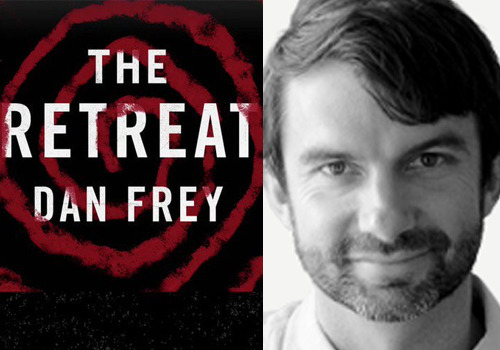
During our “Now What?” Months, we’re talking to Wrimos who’ve published their NaNoWriMo projects and asking them about the steps they took to make it happen. Today, Dan Frey, author of recent release The Retreat, shares some tips on practices to get your novel published
:
I’ve wanted to be an author since I was 10, when I first read Tolkien. I was a weird kid who didn’t fit in at school, and my parents were going through a messy divorce. But I found refuge in fantasy, and devoured The Hobbit and The Lord of the Rings. When it was over, I didn’t want the story to end, so I started writing what we’d now call fan-fiction, while dreaming that one day I’d write a book of my own.
But then, life happened. My interests shifted. I wrote plays, then advertising copy, and eventually worked my way to a career as a screenwriter. Which was incredibly exciting, but it could also be creatively frustrating, since none of my work was getting produced.
I first heard about NaNoWriMo on the podcast Scriptnotes, where Grant Faulkner discussed the program with John August. I was so inspired by the idea, I joined the community that day, and decided to try it myself.
With an idea that I’d been kicking around for a year, I dove in and started my first novel, The Retreat, in November 2017. I completed 50,000 words within the month, which put me within range of finishing a draft by the end of the year.
After a few rounds of revision, I eventually found an agent, who sent the novel out and got some interest, but alas, not a buyer. Nonetheless, I was so encouraged by how fulfilling the process had been, I decided to try another NaNoWriMo in 2018, and started work on a sci-fi book called The Future. Again, I got a strong start in November, and finished it off that momentum.
While I was working on the second book, to my great surprise, The Retreat DID find a buyer. Namely Audible, which saw it as a good fit for release as an Audible Original. It debuted on the service in December, and it’s available now!
Shortly after the sale of The Retreat, my agent took out my second NaNoWriMo book, and got interest from multiple publishers. That book sold to Del Rey, who actually offered a deal for 2 books (The Future and another that I’ll write next).
So I’ve done 2 NaNoWriMo’s, written 2 novels… and somehow sold 3 books in the process (many thanks to my amazing agent Zoe Sandler at ICM!). More importantly, I’ve achieved a childhood dream, and I know that 10-year-old-me would have his mind blown if he could see what lay ahead.
I hope NaNoWriMo inspires many more people, and for anyone contemplating their first or tenth novel, here are a few practices that I follow:
1. Know where you’re going, but don’t plan every detail.If you want to actually finish a book, it’s helpful to have a broad-strokes idea of the major plot turns, but leaving room for discovery along the way keeps the process interesting. To me, the ideal outline is a stack of 30-50 note cards.
2. Write about something you can’t shut up about.Instead of “write what you know,” write about something you want to talk about endlessly. The subject you’re hoping someone else at a party is up for discussing and debating into the wee hours. Whether it’s fashion history or 90’s video games, finding a world you’re driven to learn about and wrestle with will give you endless material.
3. Listen to your community.Share your book with friends, family, and other writers, and then (the hard part) honestly listen to their feedback. Don’t justify or defend your choices; the reader is never wrong.
4. Rewrite aggressively.First drafts are full of the joy of discovery, but the wheat is separated from the chaff by drafts 2 through 5+. Build a process so you can iterate systematically, rather than spending hours moving commas.
5. Journal daily.Even if starts as just a page a day of random thoughts, I don’t know of any better practice to cultivate sanity, discipline, honest self-reflection, and creative flexibility.
Dan Frey is a writer of film, television, theater, and now fiction. With his screenwriting partner Ru Sommer, he has developed projects for Fox, Paramount, YouTube Premium, and the Disney+ streaming service, among others. The Retreat is his first work of fiction, and his second, The Future, will be published by Penguin Random House in 2020. He lives in Los Angeles with his wife Casey and their poodle Winston. On Twitter, he’s @wordsbydanfrey
February 12, 2020
50,000 Words Down. What’s Next?

Every year, we’re lucky to have great sponsors for our nonprofit events. Fiverr, a NaNoWriMo 2020 sponsor, is here to help you with some editing tips to get your novel ready to publish:
You and your manuscript have spent a lot of time together over the past few months (or maybe even lifetime). Take a minute to marvel at your masterpiece. You started November a writer and ended a novelist. You did what most people only dream of—you sat down and wrote the darn thing. Bravo.
It’s totally normal to want to take a breather and step away from your first draft for a while. Once you’re ready to dive back in—because you wrote those 50,000 words, and they should be read!—reread it. See what’s working and what needs to be rewritten. When you’re finally happy with the revisions and ready to start thinking about publishing, it’s time to finally ask for some help. Call in editors, designers, marketers, etc. Editing, polishing, and designing your novel before you’re ready to publish is key, and you’re going to want to call on professionals to make sure the process is as smooth as possible.
The path to publishing is different for everyone. Some want to connect directly with publishers, while others are planning to self-publish. For both paths, there are websites like Fiverr. Fiverr—the freelancer marketplace—launched a new store that includes hundreds of digital services for taking your manuscript to the next level.
Check out our tips below for editing, designing, and promoting your novel:
Editing 101: Get a fresh pair of eyes on your manuscript to do deep developmental edits, catch mistakes, and utilize feedback to strengthen your manuscript. Find freelancers for everything from content editing to proofreading to beta reading.Make a lasting impression, from cover to cover: All the effort you put into writing your novel will be for nothing if you don’t capture the attention of your readers immediately. Packaging your novel right is important to position it for the market. Hire an expert for freelance services like cover design, book interiors, illustration, book blurbs and more.
Ready, set, launch: You may be planning to pitch your novel to traditional publishers, or are looking to market on your own. Who is your target audience? What is your angle? Come prepared with a book proposal, professional book trailer, and a solid marketing plan in place.
Ready to roll up your sleeves and get to work? Here’s a novel idea: visit Fiverr’s store to get started.
Top photo by Adli Wahid on Unsplash.
February 7, 2020
In Favor of Fanfiction

Fanfiction sometimes gets a bad rap, but it can be a great form to help you develop story ideas with characters you already know and love. Today, writer Monique Busacay is here to share some of the best things about fanfic:
It’s a warm afternoon in 2004. I’m in my 6th grade computer literacy class, finishing up an assignment that was teaching us how to use different search engines (before Googling became a word). Upon submission, a friend of mine shows me a website called fanfiction.net.
I didn’t understand fanfiction, at first. Fifteen years later, my understanding has transformed into an outlet for when I need a break from mid-20s crises and lore so complex it needs its own book.
Fanfiction, or fanfic for short, is any form of writing in which characters and their respective universes already exist. The definition by itself exhibits one advantage a writer can have over writing original fiction: a world is already established for them. No long nights slaving over character appearances or favorite foods or how they’d react if another character professed their love for them. Even then, a writer can defy the world that’s been created and bring the characters into a new light. Jon Snow and Daenerys Targaryen can be thrown into 2019 where Instagram exists and dragons don’t. Tony Stark and the rest of the Avengers can be alive and well in a D&D universe full of goblins and mana potions. Behind the fanfic door is a plethora of possibilities and fans creating new stories for already-beloved characters.
That’s another quirk of fanfic: the familiarity of the characters. We’re all so drawn to our favorites in all forms of media. Whether you stan Katsuki Bakugo or All Might in his true form, the writer is able to single out their favorites and utilize or manipulate their given personality to their own stories. Jesse McCree can be a doting father to a little girl instead of working for a covert division of Overwatch. Link can wield his hands for sign language at a school instead of a Master Sword in the middle of Hyrule. Writing fanfic has drawn me closer to my favorite characters. Every word is written with care. I can mix canon lore with a story of my own. Overwatch can be a coffee shop, Zelda can be an heiress to her father’s hotel. The creativity doesn’t stop and I’m sure more writers out there can come up with more prompts to support their peers.
The NaNoWriMo community itself is a motivating, driven group that always inspires me to keep writing yearlong when I’m unable to participate in the events. Fanfiction communities are the same. Writers across Archive of Our Own, WattPad, and more are their own worlds of kudos and comments, alongside being a hub of the most accessible creative works on the Internet (It’s all free!). I’ve met so many writers on Ao3 who love the same tropes as I do. We message each other to beta-read works, to toss around ideas, to scream about real-life problems. It’s a wonderful way to start writing, especially for those who may be intimidated by starting from scratch. I wish I could meet every writer I’ve met through fanfiction in person; we’re friends beyond words and bending canon to our liking.
To the writers out there who are doubting writing fanfiction, I say go for it. Fanfic is just as valid as its counterpart, and it has its perks. Perhaps one day, someone will stumble upon your work late at night, craving a new adventure with their favorite characters. And that joy is what makes fanfic all worth it.

When she’s not hand-drawing charts and writing practice questions for pharmacy school assessments, Monique is an active writer in and out of the internet. You can find her practicing poetry in a bullet journal or smashing out fanfic on a Saturday night in the comfort of her own home, because all of her social media is closed to the public.
Top photo by Artur Tumasjan on Unsplash.
February 5, 2020
Looking for advice on editing your manuscript?If you have...
Looking for advice on editing your manuscript?
If you have questions about how to turn your first draft into a polished, submittable manuscript, we’re here with a professional who can give you some answers!
Literary agent and editor Elizabeth K. Kracht will be joining us tomorrow, February 6, at 1:00 PM PST, for a live webcast to chat and do some query letter crafting exercises from her new book, The Author’s Checklist: An Agent’s Guide to Developing and Editing Your Manuscript.
The bad news: even really good manuscripts have weak spots that are enough to garner rejections from agents and publishers.
The good news: most of these problems are easy to fix—once the writer sees and understands them.
After several years of evaluating manuscripts, Elizabeth noticed that many submissions had similar problems, so she began to make a list of the pitfalls. The Author’s Checklist offers her short, easy-to-implement bites of advice, illustrated by inspiring—and cautionary—real-world examples.
Elizabeth K. Kracht is a literary agent with Kimberley Cameron & Associates, and a freelance editor. She often participates in writers’ conferences nationally and internationally and lives in Tiburon, California.
February 3, 2020
Publishing 101: The 5 Critical Steps to Getting an Agent and Getting Published

Every year, we’re lucky to have great sponsors for our nonprofit events. Today, Nathan Wilcox of Writers’ Clearinghouse, a NaNoWriMo 2019/2020 sponsor, is here to help you with an in-depth publishing how-to:
So you finished a novel. You’ve spent hundreds of hours writing. You’ve studied writing manuals. You’ve edited until your eyes crossed. You’ve recruited your friends to provide feedback. You’ve completed one of the greatest of all human accomplishments: You are a novelist.
The hard part is done, right? You’ll just send some letters off to agents and sit back and wait for them to come begging. Only it’s most likely not the agents that come calling. It’s their little red gremlin friends bent on destroying your will as an author: rejections.
Rejection is a part of being an author. Even the greatest authors have faced piles of rejections, and unless you’re ridiculously lucky, so will you. Personally, I’ve had 147 rejections across two manuscripts. Rejection is going to happen, but the truth is that it doesn’t matter. What matters is acceptance – you only need one “yes” to make all the “no’s” irrelevant. So rather than worry about rejections, let’s talk about how to get accepted.
All those rejections are exactly why we spent a full year studying why manuscripts are rejected and how authors can improve their chances of going from rejections to acceptance. From what we learned, we formed Writers’ Clearinghouse with a mission of making it easier for authors to get feedback and to get noticed.
Step 1: Query the right agents.In this new-fangled internet age, there is honestly no excuse for not researching the agents you plan to query. The information is out there, it is easy to access, and it is (mostly) free.
First, make sure that you find agents that represent your genre and target audience. Agents are people (hard to believe, I know). And just like you and me, they have certain types of books that they like to read and certain types they don’t. Compile a list of agents that represent the genre you write. The easiest way to do this is to visit one of the many agent databases out there:
www.manuscriptwishlist.com/www.agentquery.comwww.querytracker.netwww.pw.org/literary_agentswww.writersch.comwww.literaryagencies.com/list-of-literary-agents/literary-agent-directory/https://www.publishersmarketplace.com/Once you’ve found agents who are interested in what you write, then you should narrow your list. There are over a thousand agents out there. And unless you’re writing something like literary westerns in verse, there are probably hundreds that represent your genre. We recommend working in batches of 10-15 queries at a time. Here are a few questions that can help:
Do you want a young, hungry agent? Or a more established (but potentially more selective) agent?Do you have any connection to an agent – met them at a conference, went to same university, live in same city, grew up in same area, have serious blackmail dirt?When you read her bio, how did you feel about her? Did an agent stand out as someone you’d really like to work with?Did an agent mention liking or looking for something that is similar to what you’ve written?Once you have your list, thoroughly research those agents. What kind of books do they currently represent? Which authors do they represent? What have they sold in the past? Are they open for queries? All the information from this research will allow you to make sure that you are querying the right agents and that you are writing a query letter that appeals to their specific desires.
Step 2: Write a query letter that captures an agent’s attention.Agents receive hundreds of query letters EVERY WEEK. They make decisions based on a small slice of information, and for pure survival, they have to look for reasons to reject submissions, not accept them. So how do you make it as hard as possible for them to reject your query?
Follow the formula: Agents have certain expectations regarding query letters, and if you don’t meet those basic requirements, it will result in almost instantaneous rejection. A query letter is a sales letter. You are trying to get an agent to bite on your manuscript, to read the pages you’ve submitted, to ask for more.
Luckily, a lot of really smart people have written articles on how to write a query letter. And because they’re all very good, I’ll let you read them yourself:
“The 10 Dos and Don’ts of Writing a Query Letter” by Brian Klems (Writers’ Digest)“How to Write a Darn Good Query Letter” by NY Book Editors“The Complete Guide to Query Letters” by Jane Friedman“How to Write a Query That Grabs an Agent’s Attention” by Jenny Jenkins“How to Write a Successful Query Letter” by Jericho Writers“How to Write a Fantastic Query Letter” by Charlotte Dixon (The Writing Cooperative)“The Secret to Writing a Successful Query Letter” by Andrea Somberg (Manuscript Wishlist)Get your letter reviewed by a professional: Remember, you only have one shot to impress an agent. The future of your entire novel (all those hours, all the sweat and tears and frustration) rests on 300 words. That’s why we recommend you have an expert look at your query letter before you send it. A list of services that will help you polish your query letter are below:
Writers’ Clearinghouse: $20.00 — Review and feedback provided by former agentsWriters Digest Shop: $39.99 — Freelance editors, suggestions onlyBook Baby: $49.99 — Contracted independent editorsDLA Editors: $99.99 — Editing and FeedbackStep 3: Write an amazing opening.
An agent read your query letter. Her hand wavered above the big red REJECT button, but something caught her attention, and she thought, “Alright, let’s see.”
Now that agent is going to read your writing sample. Typically, this will be the first five to ten pages of your manuscript. There is an old adage that the first sentence is the most important sentence, the first page is the most important page, the first chapter is the most important chapter. The reason is obvious: if a reader doesn’t get past the first sentence, the first page, the first chapter, she won’t read your book. The same thing applies to agents.
Luckily, just like with query letters, a lot has been written about how to craft an amazing first chapter. Here are some of our favorites:
8 Ways to Write a Five-Star Chapter One by Elizabeth Sims (Writers’ Digest)How to Begin a Novel: 8 Ways to Captivate by Now NovelHow to Write the First Chapter of Your Book by Dorrance Publishing10 Things Your First Chapter Should Do: A Checklist for Self-Editing by Anne R. AllenHow to Write a Good Hook & Start Your Novel with a Bang by Sara Shepard (BookBub)Tips on Writing the First Chapter of Your Book by Regina Clark (The Writing Cooperative)
There are many more articles. You can also find webinars, videos, and workshops through your local writing association or conference. The point is that those first five to ten pages need to be dynamite, because if they’re not, the agent will not request any more.
Get your opening reviewed by a professional: Just like with the query letter, I would suggest that the first ten pages of your manuscript are far too important to leave to chance. After all the time, effort, and yes, money, you’ve put into your novel, a review of the pages that will sell it is a small investment, especially since you can get a review for as little as $20. We had a harder time finding services that will review only the first few pages, but here are a few:
Writers’ Clearinghouse: $20.00 — Evaluation and feedback in 5 categories by former agentsBook Baby: $100.00 — Line edit with commentsWriters Digest Shop: $150.00 — ($3/page, min 50 pages) High-level comments in key areas, independently contracted editorsDLA Editors: $200.00 — Editing and FeedbackStep 4: Have a publication-ready manuscript.You’ve researched the best agents, you’ve written the perfect query letter, your first ten pages are unforgettable, and an agent has just asked to see your full manuscript! This is it. You’re on your way!
Or… you wait six months and hear nothing – except your own whimpers. Trust me, I’ve been there. My latest work received several requests for the full manuscript when I queried, but when I sent it, I just got silence, crickets, the radio static from a post-apocalyptic drama.
What went wrong? I never would have known that the first third of my manuscript was critically flawed if one (incredibly kind) agent hadn’t taken the time to write me a page of notes. Critique groups are great. Beta readers are really helpful. But you know what? Unless you’re really lucky, your beta readers and critique group (as amazing as they are) do not know what it takes to get a book published.
You know who does? Agents and professional editors. Many editors provide a quicker, cheaper assessment of your manuscript that tells you exactly where it stands. If it’s ready to go, they tell you. If it needs work, they tell you where. Then, you can decide what to do next: submit it, revise it, hire a professional editor. But at least you know that you are not wasting your time by sending out a flawed manuscript.
Below is a list of companies that provide manuscript evaluation services. We, of course, suggest Writers’ Clearinghouse, not only because we’re the cheapest but also because we provide a comprehensive breakdown of your manuscript in twenty areas along with a score that you can use as part of your queries to tell agents exactly how great your manuscript is.
Writers’ Clearinghouse: $350 ($50 + $5 / 1,000 word) — Frequent discounts; Evaluation in 20 categories with comments and suggestions by former agentsWriters’ Digest Shop: $730 ($3 per page) — High-level comments in key areas, independently contracted editorsManuscript Critique Ninja: $595 (up to 100,000 words) — 20 years industry experience, editorial letter and creative suggestionsFriesen Press: $499 (up to 60k words) — 5 – 6 page editorial letter, professional editorPage Turner Manuscript Evaluations: $1,440 — “Big picture deep analysis” in 10 areasStrong Tower Publishing: $490 ($10 + $2 per page) — Top-level analysis and page-by-page discussion without specific suggestions Clear Voice Editing: $660 ($2.75 per page) — Overview of strengths and weaknesses as well as detailed feedback at the chapter levelFinally, to finish my story, I purchased an evaluation from Writers’ Clearinghouse for my manuscript (because I’m not only an owner, I’m a customer). I just wish I’d been able to do it before I sent my manuscript to all those agents because the Writers’ Clearinghouse review told me the exact same thing that agent did (practically word for word). The problem was there the entire time. If I’d only found and fixed it before I sent my manuscript to all those agents, I might be on my way to publication right now.
Step 5: Keep writing.Sometimes, we can do all the right things, tick off every box, follow every step, and things still don’t work out. And not every book is going to find an agent much less a publisher.
So, what’s an author to do? KEEP WRITING!
You’re a writer, after all, so WRITE! Start the next project, use everything you’ve learned, keep getting better, and then do it all over again.
But first, I think you owe it to yourself, to your work, to your characters, to your world, to do everything you can to get your book published. You’ve spent countless hours writing that manuscript. You’ve sacrificed for it. You’ve paid for conferences and workshops and tutorials and writing manuals. You’ve called in every favor and strained every friendship to solicit critiques and beta readers.
So why wouldn’t you spend the time and money to give that work every possible chance to succeed? And in the end, it’s not that much time, it’s not that much money. For less than $400 you can have a former agent or editor review your query letter, first ten pages, AND entire manuscript.
Is your writing worth it? I think it is.
Nathan Wilcox is a business development expert turned author who quickly learned how frustrating and opaque the process of getting published can be. He founded Writers’ Clearinghouse to take the guesswork out of publication by providing low-cost evaluations that tell authors if their manuscripts are ready for publication and if not, where they should focus their efforts. To learn more about Writers’ Clearinghouse, visit us at writersch.com.
Top photo via Adobe Stock images.
Chris Baty's Blog
- Chris Baty's profile
- 63 followers



